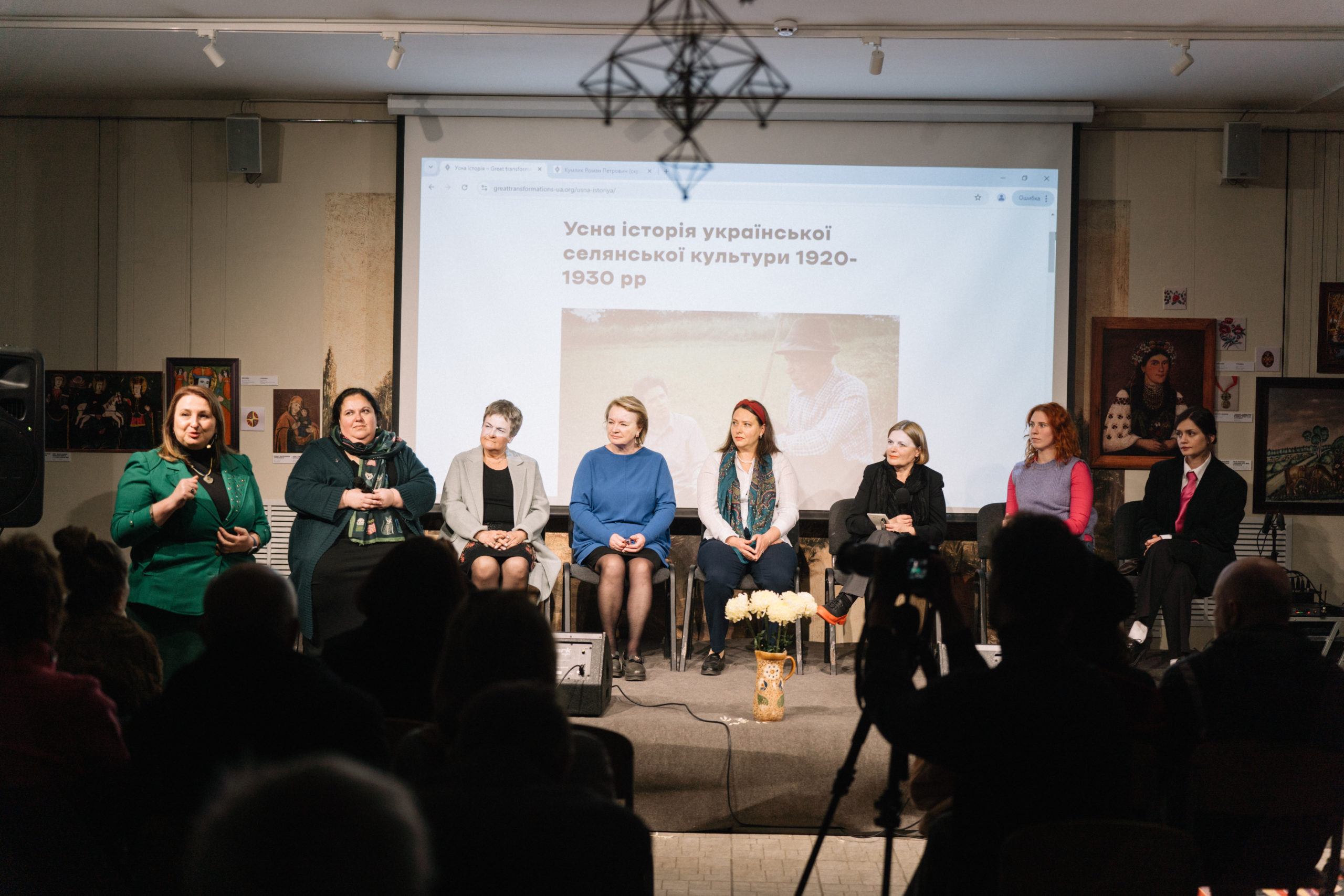The Holodomor Museum to receive as a gift tape recordings of scientific expeditions by William Noll
On October 22, 2024, the Director General of the National Museum of the Holodomor Genocide, Lesia Hasydzhak, participated in the presentation of the online archive “Great Transformations,” a platform and project implemented by the Center for the Studies of History and Culture with the support of the Ukrainian Cultural Foundation and the Holodomor Foundation Holodomor Research and Education Consortium – HREC. During the event, the director of the Center for the Studies of History and Culture, Lidia Lykhach, announced that the archive of the project’s source materials, namely tapes with recordings, would soon be transferred for safekeeping to the National Museum of the Holodomor Genocide.
The basis of the online platform “Great Transformations” are the materials of the scientific expeditions of the years 1989-1994 in the territory of Ukraine, carried out by the American researcher and ethnomusicologist William Noll along with the director of the NGO “Center for the Studies of The Oral History and Culture” (today – the founder and director of the “RODOVID” Publishing House) Lidia Lykhach, with the participation of ethnologists and folklorists Valentyna Borysenko, Vira Zaichenko, Larysa Novikova, Halyna and Mykola Korniienko, Antonina Palahniuk and others. Together, they interviewed more than 400 villagers and collected archival materials of those who survived the Holodomor and the collectivization of the Ukrainian SSR. Based on the expedition materials, William Noll wrote a scientific monograph, “Transformation of Civil Society. Oral History of Ukrainian Peasant Culture of the 1920s-30s,” published in Ukrainian in 1999 and has long since become a rarity. In May 2023, with the support of the Holodomor Foundation Holodomor Research and Education Consortium (HREC), the Canadian publishing house McGill-Queen’s University Press published William Noll’s book, “The Transformation of Civil Society. An Oral History of Ukrainian Peasant Culture, 1920s to 1930s,” in English. But paper editions cannot contain all records. However, all of them will be available on the platform online for researchers and anyone interested in Ukrainian culture.
Studies, and therefore the materials of the platform, were divided into three topics: Kobzars and Lirnyky (audio and video recordings of musical works performed by kobzars and lirnyky and interviews with them), Instrumental and vocal music (recordings of instrumental music performed on traditional folk instruments, ritual chants from various ethnographic regions of Ukraine) and Oral History (interviews with contemporaries about the transformations of traditional peasant society that occurred under the pressure of collectivization and the Holodomor of 1932-1933).
“William Noll’s collection is almost identical in value to the collection of the US Commission on the Ukraine Famine, which worked in 1985-1988 under the leadership of James Mace. In our museum collection, we do not have records of interviews with respondents from that time of birth, and recording; our first records date from ten years later. William Noll recorded people born in the early years of the 20th century who, in adulthood, survived collectivization, decentralization, mass famines of the 1920s and 1940s, the Holodomor, and the war, and experienced all the “delights” of what we call ” collective farm slavery.” The collection contains unique stories, for instance, about the creation of artels or TOZs, which we did not manage to record. Therefore, we gratefully accept this gift from Ms Lidia Lykhach, Mr William Noll and the “Great Transformations” project for further usage as a source base in scientific research and during the creation of exhibition projects and the main exposition in the future large museum” – Lesia Hasydzhak noted in her speech.
The presentation of the online platform, “Great transformations,” was also attended by Myroslava Vertiuk, deputy general director of Ivan Honchar Museum, Maryna Hrymych, doctor of historical sciences, ethnologist and folklorist, curator of scientific projects of Ivan Honchar Museum, Olha Bench, musicologist, rector of Kyiv Academy of Arts, and other experts in folklore and oral history, who shared their experience of conducting expeditions, preserving and processing collected materials, and discussed the updated importance of preserving Ukrainian cultural heritage.
Photo by Ruslan Synhaievskyi.
